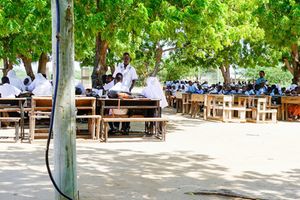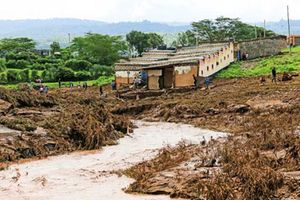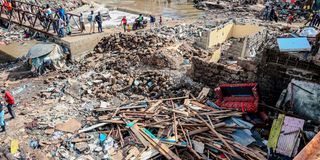
Demolished houses in Mukuru Kayaba slum, Nairobi on May 18. Hundreds of children have not reported to school for second term after their family houses were demolished. Boniface Bogita| Nation Media Group
A river that burst its banks during the recent floods in Mukuru flows near people’s houses, carrying debris and filth. A stench fills the air. Breathing is a Herculean, especially for a visitor.
Next to the river water is rubble of destroyed houses. Debris that once formed parts of warm homes is all one can see.
Men are hauling the remains of their houses and household items to makeshift homes for the night.
The wounds of the demolitions by the government are still fresh and may never heal.
Authorities demolished hundreds of shacks that many called home following President William Ruto’s directive, leaving thousands homeless. The government said it was enforcing resettlement notices issued to families living on riparian land in Nairobi.
Next to Mukuru Kayaba’s open ditches and sewage, children run around with no houses to call their own.
The hundreds of children are on a mission: to scavenge for items from the places they called home and sell them. They then take the little money earned to their parents to buy a plate of githeri – boiled mixture of maize and beans.
Mr Bonface Ouko, who owns the metal loaded onto a lorry, was the caretaker of his brother’s rental property before the demolitions.
He accuses the government of terrorising citizens.
Mr Ouko shows the Saturday Nation team the places residents are struggling to salvage whatever they can before earthmovers arrive to tear down the still standing structures.
“It is a severe blow. In the many years we have lived here, nothing like this has happened. We have been messed up. The house has been our source of income since 2013 when my brother built it,” he says.

Bonface Ouko Ogutu a resident of Mukuru Kayaba in Nairobi during an interview on May 19, 2024.
The demolitions could not have come at a worse time for Mr Ouko. As the family was still recovering from the destruction caused by floods, the earthmovers arrived. He now stares at a huge burden as the schools his children go to have increased fees.
“We have lived as a community in good and bad times. Things have never been this bad, not even during the 2007/2008 post-election violence. Families here have lost hope. It is a catastrophe to be reduced to nothing when you were a landlord,” he says.
Then we stumble on Ms Margaret Ngina’s mabati shack which has survived – perhaps for now – because her pleas. The 70-year-old has 10 children who live with her in three single rooms. Ms Ngina arrived home as the earthmovers were about to flatten her house a week ago.
She says the people in charge of the demolitions were touched by her cries, though the septuagenarian does not know her fate in the days to come.
She has lived in Mukuru for 60 years. It is here that she raised her children. Her husband died 20 years ago.
Also Read: Floods expose gaps in disaster preparedness
Many of Mr Ngina’s neighbours have asked her to leave the slum and retire to the countryside, but her family has no land.
Her mother moved to Nairobi when still young. The elderly woman says she cannot trace her roots.
“Some people think I am insane. I feed most of the children you see here but they are not even related to me,” she says.
To make matters worse for the granny, one of her daughters is mentally challenged.
Ms Ngina has moved from one hospital to another seeking her daughter’s treatment for 17 years.
The elderly woman uses crutches as she has arthritis and ulcers. She has fractured her leg three times.
Her household is not financially sound as the adult children have no stable jobs.
“Before becoming sick, I used to sell vegetables and githeri. Now we have no option but to beg,” she says.
The Saturday Nation team remained around to witness the gruelling transition from day to night with no house to sit in, eat from or sleep.
The hundreds of families that have not moved out are in the open, exposed to the elements.
It is 6.50pm, and the sun is resting behind huge dark clouds. The displaced Mukuru families are bracing themselves for a new downpour. Night and rain tag along with anguish written on the women’s faces. Shivering children struggle to find sleep.
“Isn’t it enough that we are homeless? Does it have to rain?” one asks dejectedly.
They rummage for sticks from the rubble and light a fire to keep them warm at night.
Ms Talia Achieng is at one of the fire circles with her five-month-old baby wrapped in a blanket. She is sitting at the exact spot her house stood.
The woman has known no other home for more than 20 years. The baby is oblivious of her mother’s sullen face and fatigue. Mr Achieng says she does not know where she and her child will end up. The father of the baby was sent to prison months ago over a crime Achieng says she does not know.
“My baby was fast asleep in the house when the bulldozers made their way here. We didn’t know they would reach our house. When we realised what was happening, we had to stop them quickly and save my daughter,” she says.
The women take turns to carry the baby throughout the night. Whoever has the infant must sit closest to the fire. The baby is kept under a shade of iron sheets when she sleeps during the day.
Ms Achieng is a nursing mother but cannot afford meals. Even getting a cup tea in the morning is a mountain to climb.
“I and those who used to be our neighbours before the demolitions now live together as one big family. Whoever wakes up first is in charge of the day’s meal. If that person gets nothing, we go without meals on that day and hope for a fruitful search the following day,” she says.
Bathrooms and other necessities have become a luxury. The most affected are women. They wait until midnight to take a bath in the dark as they have to use the few toilets around.
“We have not received help from the government. Mukuru Kwa Kayaba, a public primary school, provides us with lunch on Mondays, Wednesdays and Fridays,” Ms Achieng says, adding she hopes to become an engineer and give her daughter the life that she never had.
Ms Pauline Njoki, a mother of four, prays for shelter daily.
“They demolished our house, making us homeless. During flooding, we could remain in the house until the water receded. The floods did not make us homeless. We even moved out of the houses to higher ground but returned,” she says.
“The 48-hour notice from the government was too short for us to get a new home. When the house was torn down, we moved to Kenya Railways land and begged the guards to allow us in as we look for a way out of this situation.”
Ms Njoki adds that finding a house is no mean feat.
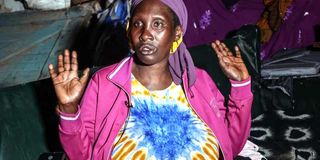
“A family might move to safety, but the government will still come with tractors to destroy the remaining houses,” she says.
“We are with 10 other displaced households of different sizes. I live with my sister’s mentally ill sons that I rescued them from the streets.”
The interview is interrupted by a baby’s cry from a dark corner. It is, in fact, Ms Njoki’s grandson who has woken up.
This is the grandson’s new sleeping area. The baby sleeps there with his mother – Ms Njoki’s daughter.
She also remembers applying mosquito repellent to her two small children who have rashes all over their faces.
“This oil was recommended to me by a chemist near here yesterday. He had seen the rashes on my daughter. It cost the family Sh60,” Ms Njoki adds.
“It has been a week and a few days since we moved here. We are yet to see the help the government promised. A Good Samaritan sponsored one of the children here.
"They had come to look for the child’s parents when they found us. The least they could do was include our names on a list for easy access to assistance. Unfortunately, there has been no action since,” she says.
When the adults stay up around fires at night, children sleep in whatever space available.
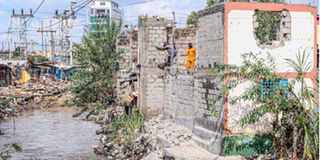
A house near Ngong River in Mukuru is demolished on May 18. Displaced families say they have not received help from the government, a claim state officials deny.
Daytime when the youngsters are up and playing is when grown-ups put their bodies down to rest, for a few hours at least.
There is no time for hygiene in these makeshift shelters. The families “clean” themselves with dirty water, which is also used for cooking. A small bottle of clean water goes for Sh10.
“The children are not in school because uniforms, books, shoes and other materials were carried by the floodwater. The headteacher has asked them to remain in school until we get the items,” Ms Njoki says.
On May 6, President Ruto said every households affected by floods in Nairobi would receive Sh10,000.
He added that the cash would ease the financial burden of the families and help them recover from the effects of the downpours.
“Proper planning must include providing food, blankets, money and mattresses to the residents. The 40,000 displaced families will be given Sh10,000 each,” President Ruto said.
“A total of 40,000 households were affected during the evacuation. Every family will get Sh10,000 to look for alternative housing.”
Government Spokesman Isaac Mwaura dismissed reports that the victims have been abandoned, stating that disbursement of the money is on.
Mr Mwaura said 9,972 households received the cash promised by the President on May 17 and 18.
“We are targeting 40,000 households and have verified 26,000,” Mr Mwaura told the Saturday Nation by phone, adding that the payments are being made through mobile money.
Orange Democratic Movement (ODM) leaders on Wednesday accused the government of failing to fulfil its promise to provide emergency financial assistance to households affected and displaced by flooding in Nairobi.
Nairobi Senator Edwin Sifuna criticised President William Ruto and the government “for making empty promises while those affected by floods continue to suffer”.
“President William Ruto promised to give Sh10,000 to every family whose house was demolished. That pledge is yet to be fulfilled,” Senator Sifuna said in the city after receiving donations sent to the ODM Disaster Response Unit in Chungwa House.
He added that the government should increase the amount to at least Sh20,000 as Sh10,000 “cannot meet the requirements of the households”.
Additional reporting by Winnie Onyando

